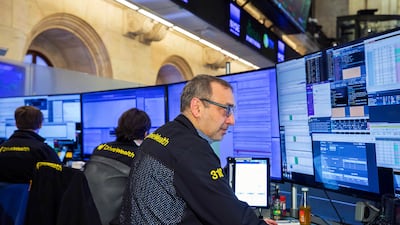Global oil prices fell to below $80 a barrel for the first time since January, on persistent fears of a recession and rising interest rates by central banks worldwide.
After starting the week in positive territory, Brent, the benchmark for two thirds of the world’s oil, was trading 0.13 per cent down at $79. 23 a barrel at 6:23pm UAE time on Wednesday. West Texas Intermediate, the gauge that tracks US crude, was down 0.34 per cent at $74 a barrel.
Brent fell 4 per cent at the end of trading on Tuesday, while WTI ended the day 3.5 per cent lower.
“Crude prices tumbled as recession worries dominated the headlines and as the oil market lost its tightness,” said Edward Moya, a senior market analyst at Oanda.
“It seems to have happened quickly but the crude demand outlook is getting crushed as we are in a slowdown basically across all the major economies. Supplies seem plentiful over the near term and that has everyone hesitating on what was one of the easiest trades of the year.”
Brent crude had gained more than 3 per cent in trading on Monday after the Opec+ alliance of 23 producers decided to extend its output oil policy and European sanctions on Russian crude came into effect on the same day.
Separately on Tuesday, the US Energy Information Administration said in its short-term energy outlook report that it expected global oil stocks to fall by 200,000 barrels per day in the first half of 2023 before rising by almost 700,000 bpd in the second half of next year.
The EIA's forecast leaves global oil inventories higher at the end of 2023, more than its previous estimate in the November, and it now projects the price of Brent crude to average $92 a barrel in 2023, $3 less than its estimate last month.
The EIA has forecast 2022 US domestic crude oil production at 11.87 million bpd and 2023 production at 12.34 million bpd.
Global economic growth is forecast to be as weak as in 2009 — during the financial crisis — as a result of the Ukraine conflict and its impact on the world economy, the Institute of International Finance said in a report this month.
The world economy is projected to grow 1.5 per cent next year, compared with 0.6 per cent in 2009, the IIF said.
This assessment follows the International Monetary Fund's move to slash its global economic growth forecast for next year due to the effects of the Ukraine conflict, broadening inflation pressures and a slowdown in China, the world’s second-largest economy.
The fund maintained its global economic estimate for this year at 3.2 per cent but downgraded next year's forecast to 2.7 per cent — 0.2 percentage points lower than the July forecast.
There is a 25 per cent probability that growth could fall below 2 per cent next year, the IMF said in its World Economic Outlook report released in October.
In a research note on Wednesday, Emirates NBD economists said "the imposition of a price cap on Russian oil" by G7countries , the EU and Australia, has not prompted any concerns over supply as yet despite reports of tanker backlogs in Turkey and concerns over a global recession remaining the predominant driver.
“Energy traders are not confidently buying dips but they will if the current sell-off sends prices close to the levels the Biden administration might refill the SPR, which is in the $70 region,” Mr Moya said.


